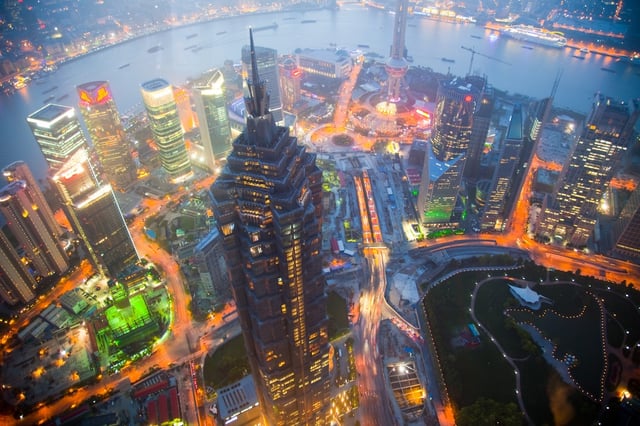
For anyone doing business in Shanghai these days, or planning to, you might want to take a look at the recent episode of Anthony Bourdain’s Parts Unknown-Shanghai. Bourdain has that rare ability to transcend genre beyond entertaining travelogues, which the episode certainly is, and get at the unique cultural qualities that make a land and people unique and fascinating. In his Shanghai episode, Bourdain achieves this especially well. Here, you see a Shanghai that is both enthralled and in conflict with itself. Bourdain takes us to a city that is booming, hugely optimistic, and embracing its new and lofty place in the world, yet below the shimmering veneer there’s fraying at the seams. Can China keep this up…the decadence, the consumption, the materialism? (China bought two billion bottles of red wine last year!)
The dichotomy of modern Shanghai—and China, for that matter—was powerfully brought to light in a scene where Bourdain goes to have dinner with a Shanghai billionaire at his firm’s enormous and private wine and dining hall. It’s rare for a travel show to use cinematography so deliberately, but the use of intense close ups certainly seemed to heighten the tension as Bourdain slurped oysters imported from France, ate $150 per pound beef from New Zealand and drank wine from Bourdeaux chosen from among the firm’s four thousand plus bottle cellar. Polite on the surface, Bourdain’s countenance strains aloud: Can indulgence on such a grand scale be sustained as China seeks to outdo America and Europe at its own game? Can we as a species sustain life as the world’s most populace nation seems overcome with consumerism and materialism?
Bourdain probes and evokes complex cultural issues as a Shanghai bus driver near bankrupts himself as he throws the lavish wedding party deemed normal in the New Shanghai while his hundred guests drink and eat themselves into oblivion—also the new norm. At what point do bellies bursts and cities crumble when so many need to eat so much just to be considered successful? Interestingly, as Bourdain steps out of the fancy restaurants and private dining halls and heads down the old alleys where traditional dishes of noodles and broth are sipped and slurped as they have been for a thousand years, many of the locals seem to be asking the same question to themselves—can China keep this up.
How about you? We’d love to hear your feedback. Have you ever lived and worked in Shanghai? Did Bourdain manage to get his finger on pulse of this amazing city? What are your thoughts about the city and life in modern China? Is it sustainable or might Western style tastes and consumption be their undoing? Learn more about China, watch our webinar below!


